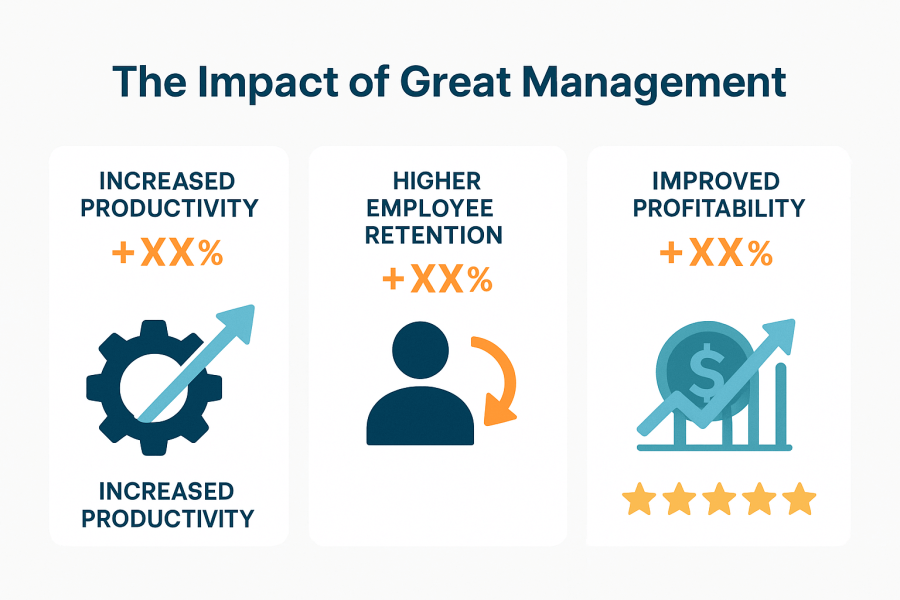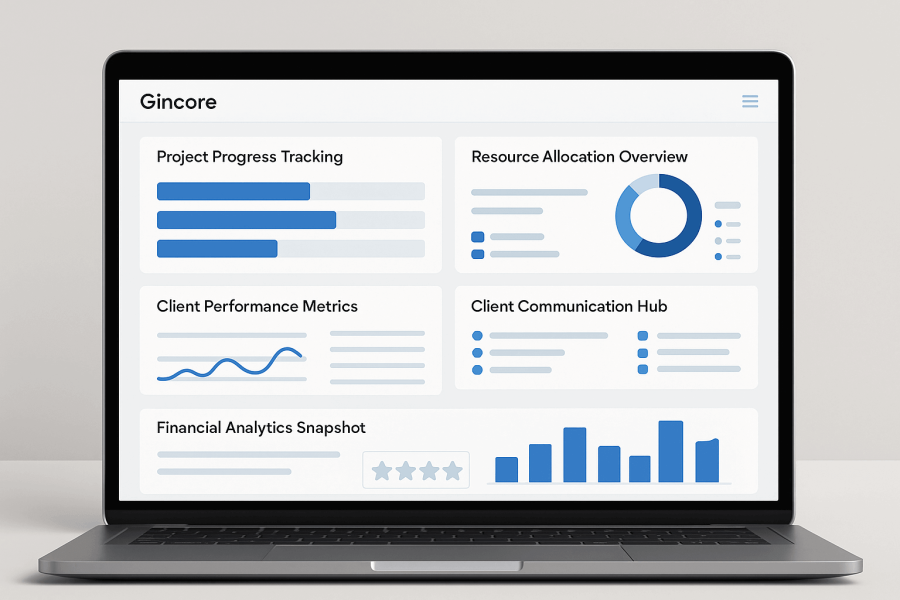Effective management is the cornerstone of thriving organizations, fostering teamwork and driving success.
Introduction: Why Great Management is the Non-Negotiable Key to Success
In today's relentlessly dynamic and often fiercely competitive business landscape, the calibre of management isn't merely a peripheral factor—it stands as the cornerstone upon which resilient and thriving organizations are forged. As research from institutions like Gallup consistently shows, effective management transcends simple task delegation or administrative oversight. It's the art and science of inspiring teams, nurturing innovation, expertly navigating multifaceted challenges, and ultimately, propelling sustainable, long-term growth.
The High Cost of Ineffective Management
Conversely, the specter of ineffective management can be a silent drain on an organization, leading to disengaged employees, plummeting productivity, stifled creativity, and an unhealthy bottom line. Studies have indicated that a significant reason for employee turnover is directly related to poor management. Great managers, however, act as powerful catalysts. They cultivate environments where individuals not only feel valued and motivated but are also empowered to contribute their best, most innovative work.
This article delves into the five fundamental principles of great management, offering a comprehensive, actionable guide for leaders at all levels—from aspiring team leads to seasoned executives. By understanding and diligently implementing these principles of good management and effective management practices, you can unlock your organization's latent potential and steer your business towards unparalleled success and market leadership.

Mastering the Core Functions of Management (The POLC Framework)
At the very heart of all effective management lies a set of foundational functions. These provide the essential roadmap for defining objectives and achieving them. While various models exist (like Fayol's or Gulick's POSDCORB), the POLC framework—Planning, Organizing, Leading, and Controlling—is widely recognized and forms the bedrock of managerial competence.
What are the Core Management Functions?
- Planning (P): This is the primary and most crucial function. It involves defining clear, ambitious yet achievable goals, establishing robust strategies to realize them, and meticulously outlining the necessary tasks, timelines, and resources. Effective planning is not static; it demands foresight, anticipating future market trends, potential challenges, and opportunities. It's about "doing the right things."
- Organizing (O): Once strategic plans are articulated, managers must structure and arrange resources efficiently. This includes designing effective team structures, clearly assigning responsibilities, judiciously delegating authority, and creating an operational framework where tasks can be executed seamlessly and synergistically.
- Leading (L): This function is the human engine of management. It's about motivating, influencing, and guiding employees towards the enthusiastic achievement of shared goals. It involves crystal-clear communication, fostering high morale, building a positive and inclusive work environment, and often, coaching and mentoring team members.
- Controlling (C): This vital function involves monitoring progress against the established plans and standards, comparing actual performance to predefined benchmarks, and decisively taking corrective action when deviations occur to ensure goals are met or exceeded. It also includes providing constructive feedback.
"Unless commitment is made, there are only promises and hopes; but no plans."
Why Mastering Core Functions is Foundational
A thorough mastery of these POLC functions ensures clarity of purpose throughout the organization, fosters the efficient and prudent use of all resources, cultivates highly motivated and engaged teams, and builds the organizational agility required to adapt to ever-changing circumstances. Neglecting these fundamentals means even the most talented teams can falter. As Peter Drucker, a luminary in management thought, emphasized, efficiency (doing things right) is important, but effectiveness (doing the right things – achieved through planning) is paramount.
How to Apply Core Functions in Your Company (Detailed Steps)
Effective Planning:
- Strategic Foresight: Conduct regular and thorough SWOT (Strengths, Weaknesses, Opportunities, Threats) analyses and PESTLE (Political, Economic, Social, Technological, Legal, Environmental) scans to understand the operating environment. Example: A retail business might identify "rising online competition" as a Threat and "growing demand for sustainable products" as an Opportunity.
- Goal Setting Mastery: Implement the SMART (Specific, Measurable, Achievable, Relevant, Time-bound) criteria for all significant goals. Ensure goals cascade logically from organizational objectives to individual tasks.
- Specific: Increase online sales revenue by 15%.
- Measurable: Track monthly sales figures against a 15% growth target.
- Achievable: Based on past growth and planned marketing efforts, 15% is challenging but attainable.
- Relevant: Aligns with the company's strategic shift towards digital channels.
- Time-bound: Achieve this within the next fiscal year.
- Contingency and Scenario Planning: Develop proactive contingency plans for identified risks and critical potential roadblocks. Explore "what-if" scenarios (e.g., "What if our main supplier faces a disruption?").
Strategic Organizing:
- Clarity in Roles: Clearly define roles, responsibilities, and reporting lines for every team member, minimizing ambiguity. Utilize tools like RACI charts (Responsible, Accountable, Consulted, Informed) for key projects. Example: For a product launch, the Product Manager is Accountable, Marketing Lead is Responsible for promotion, Sales is Consulted, etc.
- Optimized Workflows: Design and implement efficient, streamlined workflows and transparent communication channels. Regularly review and refine these processes using feedback and performance data.
- Resource Allocation: Ensure all necessary resources (human capital with the right skills, financial budgets, technological tools, information) are allocated strategically and appropriately to support planned activities.
Inspirational Leading:
- Vision Communication: Consistently communicate the company's vision, mission, and strategic goals in a compelling and relatable manner. Ensure everyone understands how their individual contribution matters.
- Empowerment & Trust: Empower employees by delegating meaningful tasks and trusting their capabilities and judgment. Foster an environment of psychological safety where team members feel comfortable sharing ideas and taking calculated risks.
- Recognition & Motivation: Implement systems for fairly recognizing and rewarding both effort and tangible achievements. Understand diverse motivators within your team (e.g., autonomy, mastery, purpose, as highlighted by Daniel Pink).
Diligent Controlling:
- KPI Establishment: Establish relevant Key Performance Indicators (KPIs) for all critical tasks, projects, and strategic goals. These should include both leading (predictive) and lagging (outcome) indicators. Example: Leading KPI for sales - number of new leads generated; Lagging KPI - total monthly sales revenue.
- Performance Monitoring Systems: Implement regular reporting mechanisms (e.g., weekly dashboards, monthly review meetings) to track progress against KPIs.
- Agile Adjustments & Feedback Loops: Be prepared and agile in making necessary adjustments to plans or execution based on performance data and feedback. Foster a culture of continuous improvement (Kaizen).
| Function | Description | Key Activities | Importance |
|---|---|---|---|
| Planning | Defining goals, establishing strategies, and outlining tasks and resources. | Goal setting, strategy formation, forecasting, budgeting, policy making. | Provides direction and a roadmap for success. |
| Organizing | Structuring work, allocating resources, and designing the organization to achieve objectives. | Designing organizational structure, job design, resource allocation, delegation, establishing communication channels. | Creates an efficient and effective operational framework. |
| Leading | Motivating, influencing, and guiding employees to achieve organizational goals. | Communicating, motivating, team building, coaching, mentoring, resolving conflicts. | Inspires action and maximizes human potential. |
| Controlling | Monitoring performance, comparing it against standards, and taking corrective action. | Establishing performance standards, measuring performance, analyzing variances, implementing corrective actions. | Ensures goals are met and facilitates continuous improvement. |
Mini-Case 1: Strategic Planning in Action
A software startup, aiming to disrupt the market, engaged in meticulous planning. They identified a niche underserved by competitors (their Opportunity), defined a 3-year goal of acquiring 50,000 users, and outlined a phased product development roadmap. Their resource allocation focused heavily on R&D and agile development in the first year. This clear plan, communicated effectively, guided every decision, from hiring to marketing spend, enabling them to hit their first-year user targets.
Understanding Management Roles and Structures
Effective management doesn't operate in a vacuum. It's profoundly influenced by the specific roles managers are expected to play and the overarching organizational structure within which they function.
What are Management Roles (Mintzberg's Model) and Organizational Structures?
Organizational structure defines the formal arrangement of roles, responsibilities, and power within a company, dictating reporting lines and communication flows. Common structural levels include:
- Top-Level Management (e.g., CEO, President, CFO, COO): Primarily responsible for the organization's overall strategic direction, long-term vision, policy-making, and ultimate accountability to stakeholders. They interface with the external environment.
- Middle-Level Management (e.g., Department Heads, Division Managers, Regional Directors): Act as the crucial conduit between top-level strategy and first-line execution. They translate broad strategies into actionable operational plans, manage other managers, and allocate resources within their units.
- First-Line Management (e.g., Supervisors, Team Leaders, Office Managers): Directly oversee and guide non-managerial employees, manage daily operations, and ensure tasks are completed efficiently and effectively according to established plans.
Beyond structure, Professor Henry Mintzberg, through extensive observational research, identified ten key managerial roles that managers enact in their daily work. These are not always distinct but often intertwined, and they are grouped into three categories:
Mintzberg's Managerial Roles:
- Interpersonal Roles: Stemming from formal authority and supporting relationships.
- Figurehead: Performing symbolic duties (e.g., greeting visitors, signing documents).
- Leader: Motivating, developing, and guiding the team; staffing and training.
- Liaison: Maintaining a network of contacts outside the work unit for information and support.
- Informational Roles: Pertaining to receiving and transmitting information.
- Monitor: Seeking and receiving information to understand the organization and its environment.
- Disseminator: Transmitting relevant information received from outsiders or other subordinates to members of the organization.
- Spokesperson: Transmitting information to outsiders on the organization's plans, policies, actions, and results.
- Decisional Roles: Relating to making significant choices.
- Entrepreneur: Searching for opportunities and initiating improvement projects to bring about change.
- Disturbance Handler: Taking corrective action during unexpected crises or conflicts.
- Resource Allocator: Making decisions about the allocation of organizational resources (people, budget, equipment, time).
- Negotiator: Representing the organization at major negotiations.
"Effective managers are not merely passive recipients of information; they are active nerve centers of their units."
| Category | Role | Description | Example Actions |
|---|---|---|---|
| Interpersonal | Figurehead | Symbolic leader; performs ceremonial duties. | Attending ribbon-cuttings, signing legal documents, hosting dignitaries. |
| Leader | Motivates, directs, trains, and supports subordinates. | Conducting performance reviews, coaching team members, setting team vision. | |
| Liaison | Maintains a network of external contacts and informers. | Attending industry conferences, serving on external boards, networking. | |
| Informational | Monitor | Seeks and receives a wide variety of information to understand the organization. | Reading industry reports, attending briefings, analyzing performance data. |
| Disseminator | Transmits information received from outsiders or from other subordinates to members. | Forwarding relevant emails, sharing meeting minutes, briefing the team. | |
| Spokesperson | Transmits information to outsiders on organization’s plans, policies, actions. | Giving press interviews, presenting to shareholders, lobbying. | |
| Decisional | Entrepreneur | Searches for opportunities and initiates improvement projects to bring about change. | Developing new products/services, spearheading a reorganization. |
| Disturbance Handler | Responsible for corrective action when organization faces important disturbances. | Resolving conflicts, responding to a crisis, addressing customer complaints. | |
| Resource Allocator | Responsible for the allocation of organizational resources of all kinds. | Creating budgets, approving expenditures, assigning staff to projects. | |
| Negotiator | Represents the organization at major negotiations. | Negotiating contracts with suppliers, resolving disputes with unions. |
Why Understanding Roles and Structures is Crucial for Effectiveness
A lucid understanding of these diverse roles and the prevailing organizational structure empowers managers to navigate their complex responsibilities with greater efficacy. It clarifies lines of communication, defines decision-making authority, and helps managers understand how their individual actions and unit performance contribute to the broader organizational mission. This clarity is foundational for maintaining principles of effective management and avoiding common organizational dysfunctions.
How to Leverage Management Structures and Roles Effectively
- Structural Alignment: Regularly assess if your current organizational structure genuinely supports your strategic objectives and allows for agility. Is it too hierarchical, creating bottlenecks? Too flat, leading to unclear accountability?
- Role Clarity & Communication: Clearly define and communicate the specific expectations, responsibilities, and authorities associated with each management level and key role. Ensure this is understood throughout the organization.
- Cross-Level & Cross-Functional Communication: Actively foster open, transparent, and bi-directional communication channels. Encourage collaboration between different management levels and across departments to break down detrimental silos.
- Empower Middle Management: Recognize middle managers as pivotal players in strategy execution and information flow. Equip them with the necessary resources, authority, training, and trust.
- Role Flexibility and Adaptability: While Mintzberg's roles provide a useful framework, encourage managers to be adaptable. Effective managers emphasize different roles as situations demand (e.g., more 'Disturbance Handler' and 'Leader' during a crisis, more 'Entrepreneur' and 'Spokesperson' during growth phases or new product launches).
Optimizing All Organizational Resources
The success of any organization is intrinsically linked to how effectively it utilizes its array of resources. These resources are not monolithic; they encompass a wide spectrum from the tangible to the intangible.
What Does Resource Optimization Truly Entail?
Resource optimization is the dynamic and strategic process of planning, scheduling, allocating, deploying, and meticulously monitoring all available organizational resources to achieve strategic objectives with maximum efficiency and value. Key organizational resources include:
- Human Resources: The collective skills, talents, knowledge, creativity, effort, and time of employees. Often cited as the most critical asset.
- Financial Resources: Capital, budgets, cash flow, credit lines, investments, and other monetary assets.
- Material Resources: Physical assets such as equipment, machinery, raw materials, components, inventory, facilities, and real estate.
- Informational Resources: Data, information systems, intellectual property (patents, trademarks, trade secrets), proprietary knowledge, and market intelligence.
- Time: A uniquely finite and non-renewable resource, the effective management of which is crucial for productivity and competitiveness.
"The aim of management is to make resources productive." (Variant of Drucker's quote emphasizing the core purpose)
Why Resource Optimization is a Strategic Imperative
Diligent and intelligent resource management yields substantial competitive advantages. These include, but are not limited to: reduced operational costs, significantly increased productivity and efficiency, improved project success rates and product quality, enhanced profitability and ROI, and higher employee morale due to a reduction in work-related stress from over or underutilization. Ultimately, it allows businesses to achieve more with existing assets and to respond with greater agility and resilience to evolving market demands and unexpected disruptions.
Practical Steps to Optimize Your Key Resources (Detailed Breakdown)
Optimizing Human Resources:
- Talent Alignment & Development:
- Continuously invest in targeted training and professional development programs.
- Strategically match individual skills, strengths, and aspirations to specific tasks and roles. This involves understanding individual capabilities and career goals.
- Action: Implement regular skill assessments and create personalized development plans.
- Engagement & Retention Strategies:
- Foster a positive, inclusive, and supportive work environment where employees feel valued.
- Implement fair compensation, benefits, and robust recognition systems.
- Actively work to retain top talent by understanding their needs and providing growth opportunities.
- Workload Balancing & Well-being:
- Utilize resource management tools and techniques to ensure equitable workload distribution.
- Proactively monitor for signs of employee burnout or underutilization and address them promptly.
- Promote work-life balance and employee well-being initiatives.
Optimizing Financial Resources:
- Robust Budgeting & Accurate Forecasting:
- Implement rigorous budgeting processes that align with strategic priorities.
- Employ accurate financial forecasting techniques, regularly reviewing budget vs. actuals to identify variances.
- Effective Cost Control & ROI Analysis:
- Diligently track all expenses and identify areas for potential cost reduction without compromising quality or strategic goals.
- Conduct thorough ROI (Return on Investment) analysis for all significant investments and projects.
- Prudent Cash Flow Management:
- Maintain healthy cash flow through efficient management of accounts receivable and accounts payable.
- Develop strategies for managing working capital effectively.
Optimizing Material Resources:
- Lean Inventory & Waste Reduction:
- Implement lean principles to optimize inventory levels (e.g., Just-In-Time systems where feasible), thereby reducing holding costs, obsolescence, and waste.
- Action: Regularly audit inventory and identify slow-moving or obsolete stock.
- Preventative Maintenance & Asset Longevity:
- Ensure equipment, machinery, and facilities are well-maintained through proactive preventative maintenance schedules to minimize costly downtime and extend asset life.
- Supply Chain Efficiency & Reliability:
- Streamline your supply chain by optimizing logistics, negotiating favorable terms with reliable suppliers, and diversifying sources where appropriate.
Optimizing Informational Resources:
- Data-Driven Decision Making:
- Leverage data analytics and business intelligence (BI) tools to transform raw data into actionable insights that inform strategic and operational decision-making.
- Effective Knowledge Management Systems:
- Implement systems and processes for capturing, storing, sharing, and retrieving critical organizational knowledge, best practices, and lessons learned.
- Action: Create a centralized, easily searchable knowledge base or internal wiki.
- Robust Information Security:
- Protect sensitive company and customer data, as well as intellectual property, through comprehensive cybersecurity measures, access controls, and employee training.
Optimizing Time:
- Prioritization Frameworks & Techniques:
- Train teams to utilize effective prioritization frameworks like the Eisenhower Matrix (Urgent/Important), MoSCoW method (Must have, Should have, Could have, Won't have), or value-effort matrix.
- Process Streamlining & Bottleneck Removal:
- Continuously analyze and map existing workflows to identify and eliminate bottlenecks, redundancies, and time-wasting activities.
- Action: Conduct regular process improvement workshops (e.g., Kaizen events).
- Productive Meeting Culture:
- Implement best practices for meetings: ensure they have a clear agenda, defined objectives and desired outcomes, a strict time limit, and only essential attendees. Distribute minutes and action items promptly.
| Pitfall | Description & Symptoms | Common Causes | Strategic Solutions & Methods |
|---|---|---|---|
| Overallocation / Burnout | Employees assigned more work than feasible within normal hours; leads to stress, decreased quality, missed deadlines, and eventual turnover. | Poor forecasting, unrealistic project deadlines, uncontrolled scope creep, lack of clear prioritization, "hero culture". | Accurate capacity planning, use of resource leveling tools, clear project prioritization, implementing buffer management, regular workload reviews, promote work-life balance, encouraging open communication about workload. |
| Underutilization / "Boreout" | Employees not fully engaged with meaningful work; leads to wasted potential, boredom, skill atrophy, low morale, and potential departure for more challenging roles. | Inaccurate demand forecasting, poor task distribution, lack of visibility into project pipelines or individual skills, fear of "bothering" busy colleagues. | Better demand forecasting, cross-training initiatives, creating a "skills inventory", implementing internal project marketplaces or "gig" opportunities, encouraging proactive seeking of tasks, clear visibility of available resources and skills. |
| Skill Gaps / Mismatches | Team lacks necessary competencies for current or upcoming tasks; tasks assigned to individuals without the requisite skills, leading to errors, delays, and frustration. | Rapid technological changes, evolving market needs, insufficient investment in training, poor initial hiring decisions, lack of succession planning. | Regular skills audits and gap analysis, robust and continuous training & development programs, mentorship programs, strategic hiring to fill critical gaps, use of specialized contractors for short-term needs, fostering cross-functional team formation and knowledge sharing. |
| Inaccurate Forecasting (Time, Budget, Personnel) | Incorrect estimation of the resources required to complete projects or ongoing work, leading to budget overruns, missed deadlines, or last-minute scrambling. | Lack of reliable historical data, over-optimism bias, failure to account for risks and contingencies, changing project scopes without re-forecasting, inadequate forecasting tools or techniques. | Systematic use of historical data, involving experienced team members in estimation, employing techniques like three-point estimating (optimistic, pessimistic, most likely), PERT analysis, agile methodologies with iterative planning and re-estimation, using resource forecasting software. |
| Scope Creep | Uncontrolled changes or continuous growth in a project's scope after it begins, often without corresponding adjustments to time, budget, or resources. | Vague or incomplete initial requirements, lack of a formal change control process, desire to please clients or stakeholders by saying "yes" to all requests, "gold plating" by the team. | Detailed and agreed-upon initial scope definition (Statement of Work - SOW), a formal change request process with impact assessment, regular communication with stakeholders to manage expectations, ensuring any approved scope changes are accompanied by adjustments to resources and timelines. |
| Siloed Resources / Poor Visibility | Resources (especially specialized human talent or equipment) are confined within specific departments or teams and not shared effectively across the organization; leads to duplication of effort, underutilization in one area while another is starved. | Strong departmental silos, lack of a centralized resource management function or system, poor inter-departmental communication, "hoarding" of resources by managers. | Implementing centralized resource management systems (like Gincore for service businesses, which can show availability of technicians/equipment), creating cross-departmental collaboration platforms, establishing clear protocols for requesting and sharing resources, promoting a "one team" organizational culture that values shared success. |
Mini-Case 2: Optimizing Human Resources for a Tech Project
A software development company faced recurrent delays. An analysis revealed that their most skilled Java developers (a key Human Resource) were often bogged down with minor bug fixes instead of complex feature development. By implementing a tiered support system (Organizing) and training junior developers to handle initial bug triage (Resource Optimization & Leading), senior developers were freed up. This re-allocation, coupled with a project management tool to better track time and tasks (Controlling), significantly improved development velocity and team morale. This also involved understanding the Informational Resource of bug reports and directing them appropriately.

Harnessing Emotional Intelligence (EQ) – The Human Core of Management
In the intricate dance of management, while strategies and processes provide the steps, Emotional Intelligence (EQ) is the rhythm and grace that brings it all to life. It's increasingly recognized by thought leaders like Daniel Goleman as indispensable for effective leadership and a core component of the five principles of great management. [Source: Daniel Goleman, "Emotional Intelligence: Why It Can Matter More Than IQ" and "Working With Emotional Intelligence".]
Defining Emotional Intelligence in a Leadership Context
Emotional Intelligence is the capacity to be acutely aware of, control, and express one's own emotions, and to handle interpersonal relationships judiciously and empathetically. For managers, this means more than just being "nice"; it involves a sophisticated interplay of the following key components, as outlined by Goleman:
- Self-Awareness: The cornerstone of EQ. It's a deep understanding of your own emotions as they happen, your strengths, your weaknesses, your core values, your drivers, and their direct impact on your thoughts, actions, and the people around you.
- Self-Regulation (Self-Management): The ability to manage your internal states, impulses, and resources. This includes controlling disruptive emotions, thinking before acting, maintaining composure under pressure, and adapting to changing situations with flexibility and thoughtfulness.
- Motivation (Internal): A passion for work that goes beyond external rewards like money or status, driven by an intrinsic desire to achieve and improve.
- Empathy (Social Awareness): The ability to understand the emotional makeup of other people; skill in treating people according to their emotional reactions. This includes sensing others' feelings and perspectives, taking an active interest in their concerns, and understanding team dynamics and organizational culture.
- Social Skills (Relationship Management): Proficiency in managing relationships, building networks, and an ability to find common ground and build rapport. This is where the other EQ components are put into action to foster positive interactions.
"If your emotional abilities aren't in hand, if you don't have self-awareness, if you are not able to manage your distressing emotions, if you can't have empathy and have effective relationships, then no matter how smart you are, you are not going to get very far."
The Undeniable Impact of EQ on Leadership, Team Performance, and Culture
The evidence is compelling: EQ is a powerful differentiator in leadership effectiveness. Research from prestigious organizations like Harvard Business Review and McKinsey & Company consistently highlights that leaders with high EQ foster significantly greater team engagement, inspire higher levels of productivity, navigate conflicts more constructively, and build more resilient, positive, and psychologically safe workplace cultures. They are demonstrably better communicators, more adept decision-makers, and more effective change agents. Conversely, a deficiency in leadership EQ is frequently identified as a root cause of employee dissatisfaction, disengagement, and subpar performance.
| EQ Component | Description | Importance for Managers | Development Strategies |
|---|---|---|---|
| Self-Awareness | Understanding your own emotions, strengths, weaknesses, drives, values, and impact on others as they occur. Includes realistic self-assessment and a well-grounded sense of self-confidence. | The absolute foundation for all other EQ skills; enables authentic leadership, sound decision-making, and self-improvement. Allows managers to understand how their mood affects their team. |
|
| Self-Regulation (Self-Management) | Controlling or redirecting disruptive emotions and impulses; adapting to changing circumstances with thoughtfulness and integrity. Ability to suspend judgment. | Maintains composure and clarity under pressure, fosters trust and reliability among the team, enables thoughtful responses rather than impulsive reactions, crucial for managing crises. |
|
| Motivation (Internal) | Being driven to achieve for the sake of achievement itself; a passion for the work, a desire to constantly improve, and optimism even in the face of adversity and setbacks. | Drives higher performance and quality standards, inspires and energizes the team, fosters resilience and commitment to long-term goals, encourages initiative and proactivity. |
|
| Empathy (Social Awareness) | Considering others' feelings, especially when making decisions; the ability to understand different perspectives and sense unspoken emotions. Skill in treating people according to their emotional reactions. | Builds stronger, more trusting relationships, improves communication and collaboration, enhances team cohesion, enables effective conflict resolution, crucial for understanding customer and employee needs. |
|
| Social Skills (Relationship Management) | Managing relationships effectively to move people in desired directions; proficiency in communication, influence, conflict management, collaboration, and team leadership. The culmination of other EQ skills. | Essential for leading and developing teams, persuading and influencing stakeholders, managing change effectively, building extensive networks, and resolving conflicts constructively. |
|
How to Cultivate and Apply Emotional Intelligence Daily
Developing EQ is an ongoing journey of self-improvement, not a one-time training event. Consistent, conscious effort is key:
- Active Listening Mastery: Make a conscious effort to truly listen to understand, not just to formulate your reply. This involves paying full attention (minimizing distractions), withholding premature judgment, reflecting on what's said to ensure understanding, and asking clarifying, open-ended questions. (This principle is also a cornerstone of Stephen Covey's "7 Habits of Highly Effective People" - Seek First to Understand, Then to Be Understood).
- Mindful Communication Practices: Before speaking or writing, especially in potentially sensitive situations, pause and consider the potential impact of your words, tone, and body language on the recipient. Choose your communication style thoughtfully.
- Empathetic & Constructive Feedback Delivery: When providing feedback, frame it constructively. Focus on specific behaviors and their impact, and on fostering development rather than on personal criticism. Acknowledge the other person's perspective and efforts.
- Actionable Tip: Use the "Situation-Behavior-Impact" (SBI) model for feedback.
- Conflict as an Opportunity for Growth: Instead of avoiding disagreements or viewing them as inherently negative, learn to approach conflicts as opportunities for deeper understanding, collaborative problem-solving, and ultimately, stronger solutions.
- Value Diverse Perspectives: Actively solicit, listen to, and genuinely value different viewpoints and experiences within your team and organization. This leads to more inclusive and well-rounded decision-making.
- Lead by Authentic Example: Consistently demonstrate the emotional intelligence you wish to see in your team. Your behavior – how you handle stress, communicate, and interact with others – sets the prevailing tone for your entire team.
Developing Deep Business Acumen – Seeing the Bigger Picture
While the preceding principles focus on the 'how' and 'with whom' of management, deep Business Acumen addresses the 'what' and 'why' within the specific, dynamic context of your organization and its broader industry. It's the crucial ability to understand complex business situations and respond with sharp insight, sound judgment, and decisive action that drives positive outcomes.
What is Business Acumen for a Modern Manager?
Business acumen, in essence, is keenness and speed in understanding and dealing with a "business situation" (which encompasses both risks and opportunities) in a manner that is likely to lead to a good, sustainable outcome. For a manager operating in today's complex environment, this multifaceted capability encompasses:
- In-depth Industry Knowledge: A comprehensive understanding of the specific industry's dynamics, current and emerging trends, key influential players, regulatory landscape, technological shifts, and prevailing competitive forces.
- Profound Organizational Insight: A thorough grasp of the company's unique vision, mission, overarching business strategies, operational processes, core competencies, value chain, organizational culture, financial health, and key performance drivers.
- Astute Market & Customer Understanding: Deep, empathetic knowledge of target market segments, evolving customer needs and preferences, purchasing behaviors, decision-making processes, pain points, and a clear understanding of how the company's products or services deliver differentiated value. As Peter Drucker famously stated, "The purpose of business is to create and keep a customer."
- Strong Financial Literacy: The ability not just to read, but to interpret financial statements (P&L, balance sheet, cash flow statement), understand key financial ratios and performance indicators (KPIs), identify the drivers of profitability and value creation, and assess the financial implications of strategic and operational decisions.
- Holistic Strategic Thinking: The capacity to see the bigger picture, understand how various internal functions and external factors interrelate and influence each other, anticipate future consequences of current actions, and make decisions that are consistently aligned with the organization's long-term strategic goals.
"The most successful executives are those who are voracious learners and can connect the dots between disparate pieces of information to see the larger strategic landscape."
Why Business Acumen Separates Good Managers from Truly Great Leaders
Managers equipped with strong business acumen consistently make more informed, impactful, and strategically sound decisions. They are better positioned to identify and capitalize on emerging market opportunities, anticipate and effectively mitigate potential risks, allocate scarce resources with greater precision and impact, and align their team's efforts seamlessly with the company's overarching strategic imperatives. This contextual intelligence—the ability to understand the "why" behind the "what"—allows them to apply universal management principles (like POLC or EQ) in the most relevant and effective manner for their specific business context, thereby driving superior results, fostering innovation, and building a sustainable competitive advantage.
Actionable Strategies to Significantly Enhance Your Business Acumen
- Become an Insatiable Industry Scholar:
- Read Voraciously & Widely: Regularly consume a variety of industry-specific publications, academic journals, market research reports, competitor analyses, and influential books by business thought leaders.
- Attend Key Events & Network: Actively participate in relevant industry conferences, professional seminars, webinars, and trade shows to stay abreast of new trends, technologies, and best practices, and to build your professional network.
- Deep-Dive into Your Own Organization's Ecosystem:
- Master Your Financials: If financial statements are not your strong suit, take courses, seek mentorship from finance colleagues, or use online resources to deeply understand your company's P&L, balance sheet, cash flow dynamics, and key financial levers.
- Embrace Cross-Functional Learning: Actively seek opportunities to learn about the functions, challenges, and contributions of other departments within your organization (e.g., marketing, sales, operations, R&D, HR). Volunteer for cross-functional projects or task forces. [Gincore: Understanding how Gincore integrates various business functions can aid this.]
- Cultivate Deep Customer Empathy & Understanding:
- Engage Directly with Customers: Whenever possible, spend time talking directly to current customers (and even former or prospective customers) to gain firsthand insights into their experiences, unmet needs, evolving expectations, and pain points.
- Analyze All Customer Feedback Channels: Systematically review and analyze customer feedback from all available channels (surveys, online reviews, social media, customer support interactions, sales team input).
- Develop a Keen Understanding of the Competitive Landscape:
- Conduct Regular Competitive Intelligence: Understand your key competitors' strengths, weaknesses, strategies, market positioning, product offerings, customer base, and recent moves. Identify their sources of competitive advantage.
- Practice Strategic & Holistic Thinking Daily:
- Connect the Dots & Anticipate Consequences: Make it a habit to analyze how different internal factors (e.g., a new technology adoption, a change in leadership) and external factors (e.g., a shift in consumer behavior, new legislation, economic fluctuations) might impact your business unit, your customers, and the overall company.
- Seek Mentorship & Diverse Viewpoints: Learn from senior leaders within and outside your organization who demonstrate strong business acumen. Actively seek out diverse perspectives when analyzing complex business situations.
Mini-Case 3: Business Acumen Driving Market Adaptation
A retail manager noticed a consistent decline in foot traffic despite a strong local economy (*Market Understanding*). Instead of just cutting costs, she investigated further. She analyzed customer demographics (*Customer Understanding*) and local competitor strategies (*Industry Knowledge*). She discovered a growing trend towards experiential retail and a new competitor offering in-store workshops. Armed with this *Business Acumen*, she proposed and implemented a series of in-store events and product demonstrations, transforming her store into a community hub. This not only reversed the decline in foot traffic but also significantly boosted sales and customer loyalty by aligning the store's offering with evolving market demands.
The Gincore Advantage: Natively Integrating Tools for Superior Management
Throughout this exploration of the five principles of great management, a recurring theme is the critical need for clarity, operational efficiency, and data-informed decision-making. In the contemporary business environment, modern digital tools are no longer an optional luxury but an absolute necessity for managers striving to excel and drive their teams towards peak performance.
For instance, effectively implementing Pillar 1's "Controlling" function, fostering genuine Pillar 4's "Empathy" through a better understanding of team workload and challenges, or strategically optimizing Pillar 3's "Human and Material Resources" can be significantly amplified and streamlined with the right integrated platform.
This is precisely where solutions like Gincore offer a distinct and tangible advantage, particularly for service-based businesses navigating complex operational demands. Gincore is meticulously designed to be more than just disparate pieces of software; it's a comprehensive, unified business management ecosystem that empowers managers to:
- Automate and Streamline Core Operations: By reducing manual, repetitive administrative work (directly aiding Resource Optimization for valuable time), Gincore allows managers to dedicate more focus and energy to strategic leadership, proactive team development, and high-value customer interactions (supporting Leading and enhancing Business Acumen).
- Enhance Task, Project, and Employee Management: Features enabling clear assignment of tasks, real-time progress tracking across projects, and objective performance monitoring directly support the Organizing and Controlling functions. This data-rich environment also provides a solid foundation for fair, objective, and developmental feedback, which is crucial for Leading with high EQ.
- Centralize Client and Order Management: A unified, 360-degree view of all customer interactions, service histories, and order lifecycles significantly improves Business Acumen by providing deeper customer insights. This enables more personalized, responsive, and ultimately, more profitable service delivery.
- Provide Actionable, Real-Time Reports & Analytics: Access to data-driven insights into team productivity, project profitability, operational efficiency, and key performance indicators empowers managers to make faster, better-informed decisions (strengthening the Controlling function and overall Business Acumen).
- Improve Team Communication and Cross-Functional Collaboration: Centralized information hubs, shared calendars, and integrated communication tools ensure everyone across the team, whether in the office or in the field, is on the same page. This is vital for effective Leading and efficient Organizing.
By natively integrating these critical functionalities, Gincore doesn't just support individual management principles in isolation; it helps weave them together into a more cohesive, synergistic, and effective management practice. This holistic approach allows managers to spend less time entangled in day-to-day administrative tasks and more time focusing on what truly matters: leading people, nurturing talent, and driving strategic growth for the business.

Conclusion: Your Path to Management Excellence Starts Now
The five pillars of great management—mastering core POLC functions, deeply understanding management roles and organizational structures, strategically optimizing all resources, genuinely harnessing emotional intelligence, and diligently developing profound business acumen—are not merely abstract theories found in textbooks. They are interconnected, actionable principles that form the very foundation of exceptional leadership and are the bedrock of sustained organizational success in any industry.
Embracing these principles is not a one-time event or a completed checklist, but rather an ongoing, dynamic journey. It requires a commitment to continuous learning, courageous self-reflection, agile adaptation to new challenges and insights, and an unwavering dedication to achieving excellence in how you lead and manage. Remember, effective management practices are cultivated through deliberate practice and experience, not just passively learned.
We encourage you to select one or two principles from this comprehensive guide that resonate most profoundly with your current managerial challenges or personal development goals. Start implementing the suggested strategies and actionable steps today. Actively seek honest feedback on your progress from your team, peers, and mentors. Be patient with yourself during this process of growth, and remain persistent in your efforts to refine your skills.
By consciously, consistently, and diligently applying these five key principles of management, you will undoubtedly transform your leadership effectiveness, build more resilient, engaged, and high-performing teams, and guide your organization towards a future filled with remarkable and lasting achievement.
Frequently Asked Questions (FAQ) - Expanded
What are the 5 basic principles (or functions) of management according to theorists like Fayol?
Henri Fayol, a pioneer of management theory, identified five primary functions: Planning (examining the future and drawing up a plan of action), Organizing (building up the structure, material, and human, of the undertaking), Commanding (maintaining activity among the personnel), Coordinating (binding together, unifying and harmonizing all activity and effort), and Controlling (seeing that everything occurs in conformity with established rule and expressed command). Many modern interpretations simplify "Commanding" and "Coordinating" into a broader "Leading" function, aligning with the POLC model discussed in this article.
Is one management principle more important than the others?
While all five pillars are interconnected and vital for holistic management success, the impact of Harnessing Emotional Intelligence (EQ) and the Leading aspect of the POLC framework cannot be overstated. As Daniel Goleman and other experts suggest, without strong interpersonal skills, empathy, and self-awareness, even the most brilliant strategies or perfectly organized resources may fail to yield optimal results because people are at the heart of execution. However, it's crucial to understand that neglecting any single pillar can create a significant point of failure for a manager or an organization.
How can new managers quickly improve their skills based on these five principles?
New managers can benefit immensely by focusing on practical applications of each pillar:
- Mastering Core Functions (POLC): Start by mastering clear goal setting for their team using the SMART criteria. Establish simple, consistent tracking mechanisms for key tasks and projects.
- Understanding Roles/Structures: Take time to thoroughly understand their specific role, responsibilities, level of authority, and key stakeholders. Learn the informal communication channels as well as formal ones.
- Optimizing Resources: Practice effective delegation – not just offloading tasks, but empowering team members with responsibility and providing necessary support. Learn basic time management techniques for themselves and their team.
- Harnessing EQ: Make active listening a daily habit in every interaction. Consciously try to understand their team members' perspectives and motivations before responding or making decisions.
- Developing Business Acumen: Be curious. Ask many questions to understand how their team's work directly contributes to the company's larger strategic goals and serves customer needs.
Above all, seeking mentorship from experienced managers is one of the most effective ways for new leaders to accelerate their development across all these principles.
What are some common pitfalls to avoid when trying to implement these management principles?
Common pitfalls that can derail even well-intentioned managers include:
- Micromanagement: (This stifles employee growth and autonomy, violating principles of effective Leading, Organizing, and demonstrating a lack of trust, which is related to EQ).
- Poor or Infrequent Communication: (Clear, consistent communication impacts all pillars, especially crucial for Leading, Planning, and Controlling).
- Inconsistent Application of Rules/Standards: (This undermines the Controlling function and perceptions of fairness, which can negatively impact team morale and EQ).
- Failing to Delegate or Delegating Ineffectively: (Hinders Resource Optimization, team development, and can overwhelm the manager).
- Ignoring or Dismissing Employee Feedback or Concerns: (Highly detrimental to building trust (EQ), effective Leading, and fostering a culture of continuous improvement).
- Lack of Strategic Alignment in Daily Tasks: Focusing heavily on operational tasks without clearly understanding or communicating how they connect to the bigger picture (indicates weak Business Acumen and ineffective Planning).
- Resistance to Change or New Ideas: (Hinders adaptability, a key aspect of Self-Regulation in EQ and crucial for evolving Business Acumen).
How can I effectively automate management processes to become more efficient?
Automation is a powerful lever for modern management efficiency. Begin by identifying areas with repetitive, time-consuming, and low-value manual tasks. Key areas for automation often include:
- Task Management & Workflow Automation: Use project management or workflow automation tools to automate task assignment, deadline reminders, status updates, and approval processes.
- Reporting & Analytics: Automate the generation of regular performance reports, sales dashboards, and operational analytics to save time and ensure consistent data.
- Customer Communication (Basic): Utilize CRM features for automated email follow-ups, appointment reminders, or responses to frequently asked basic queries.
- Financial Processes: Explore automation for invoicing, expense tracking, payment reminders, and payroll where appropriate and secure.
Management software like Gincore is specifically designed for service businesses to automate many of these critical processes. This includes features for intelligent scheduling and dispatching, automated invoicing and payment tracking, streamlined inventory management, comprehensive customer relationship management (CRM), and insightful performance analytics. By automating these functions, Gincore frees managers and their teams from significant administrative burdens, allowing them to redirect their valuable time and energy towards strategic leadership, fostering team development, enhancing customer relationships, and addressing complex exceptions – precisely the areas where human insight and intervention deliver the most value.
How do these five principles of management apply to remote or hybrid team management?
The fundamental principles of great management remain universally applicable, but their application often needs thoughtful adaptation for remote or hybrid team environments:
- Planning: Requires even clearer, more explicit goal setting, well-defined deliverables, and transparent expectation management due to reduced informal oversight. Regular check-ins on progress against plans are vital.
- Organizing: Demands robust digital tools and platforms for seamless collaboration, document sharing, and project management. Clear delineation of remote vs. in-office tasks and responsibilities is key.
- Leading: Needs more intentional and frequent communication to maintain team cohesion and morale. Building trust is paramount. Leaders must be adept at virtual motivation and recognizing signs of disengagement or burnout. Showing empathy for individual remote work challenges is crucial.
- Controlling: Relies more heavily on outcome-based performance metrics and deliverables rather than direct observation of activity. Regular virtual feedback sessions are essential.
- Understanding Roles/Structures: Clear communication of roles and reporting lines is even more important when team members are not physically co-located. Ensuring everyone knows who to contact for what is critical.
- Resource Optimization: Involves ensuring remote workers have the necessary technology, secure access, and support. Time zone differences and asynchronous work patterns need to be managed effectively.
- Business Acumen: Helps in structuring remote work in a way that still effectively meets market demands and customer needs, adapting processes as necessary for a distributed workforce.
Key success factors include leveraging technology effectively (e.g., using platforms like Gincore for coordinating remote service teams and managing field operations), establishing clear communication protocols and cadences, and intentionally fostering a sense of connection and team identity despite physical distance.

.png)












